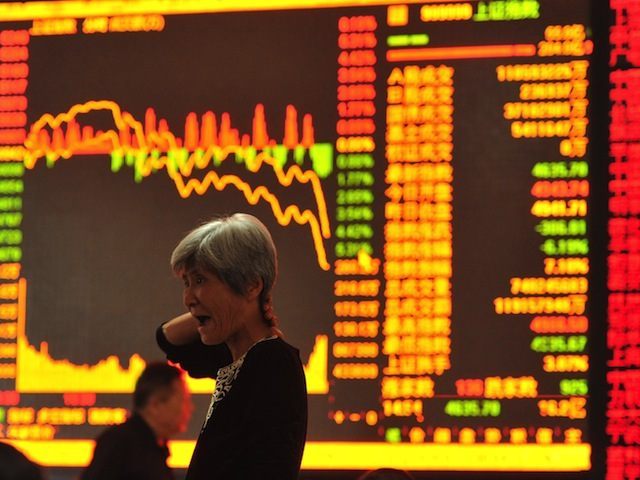Greece announced a six day bank and stock market holiday on Sunday after long lines of their citizens queued up over the weekend to drain all their savings at ATMs.
The euro exchange rate and neighboring stock markets fell only modestly, but the Greek crisis set off panic of a debt crisis contagion hitting China. Despite this weekend’s announcement of the biggest emergency monetary stimulus by China’s central bank since the Lehman Brothers bankruptcy in 2008, stocks in Shanghai and Hong Kong plummeted in afternoon trading by almost -8 percent.
Speaking in a televised address, Greek Prime Minister Alexis Tsipras urged calm and insisted bank deposits were safe. But under capital controls, local cash machines will reopen on Tuesday with withdrawals limited to $67 a day. The people were hitting multiple ATMs to try to get cash, filling up gas cans and emptying food markets.
Tsipras blamed fellow European Union members and the European Central Bank for refusing to extend Greece’s bailout beyond Tuesday when Athens is expected to default on its $1.7 billion payment to the International Monetary Fund. Greece also faces a $3.9 billion bond payment to the European Central Bank on July 20.
President Barack Obama and German Chancellor Angela Merkel spoke on Sunday about the latest phase of the crisis and how important it is for Greece to stay in the euro. Merkel said that the European Central Bank would maintain its Emergency Liquidity Assistance emergency cash lifeline to the Bank of Greece through Tuesday when France and Germany will hold a crisis meeting regarding the fate of Greece.
Interest rates on Greece’s benchmark 10-year notes have almost doubled to 10.8 percent in the past year, while those on its two-year debt topped 20 percent. Greek stocks have tumbled by 35 percent with banks plummeting by over 50 percent.
The Greek crisis seemed to spread fear across Asian financial markets last week over concerns that China might also be on the cusp of a major debt crisis. The nation’s benchmark Shanghai Composite index plunged by -7.4 percent on Friday, and the tech heavy Shenzhen Composite closed down -7.9 percent. Losses could have been much larger, but hundreds of individual stocks lost were suspended after falling the index’s -10 percent daily downward limit. Both exchanges are down about -27 percent this year.
To avoid what some feared would be a double digit market crash on Monday, China’s central bank on Saturday made its most aggressive monetary stimulus to boost the economy since December 22, 2008 after the Lehman Brothers bankruptcy and the peak of the global financial crisis. The People’s Bank of China cut both its one-year lending and deposit rates by 25 basis points to 4.85 percent and 2.0 percent respectively. The move was the fourth interest rate cut since November.
The PBOC also lowered the amount of cash that large banks must reserve against loans by one half percent to spur new lending. The Wall Street Journal estimated that what Chinese authorities labeled as a “targeted cut” and traders called a fire-hose could pump up to $79 billion of liquidity into the financial system.
The PBOC stimulus caused Chinese stock markets to rally up over +2 percent on the Monday opening bell, but prices were then hammered by a tsunami of sell orders that sent the Shanghai Stock Exchange Composite Index plummeting down by -7.5 percent. Once again, stepper losses were prevented as trading in hundreds of individual stocks was suspended after falling by the -10 percent daily downward limit.

COMMENTS
Please let us know if you're having issues with commenting.